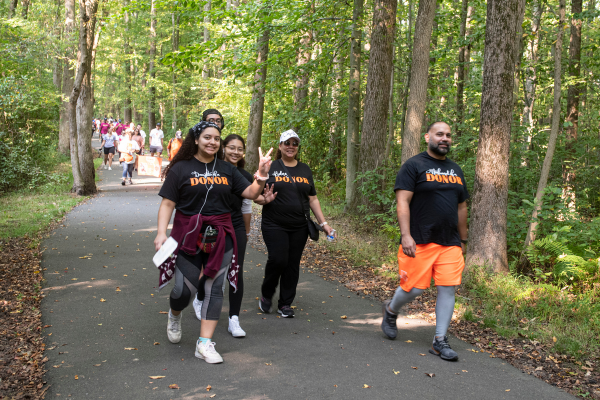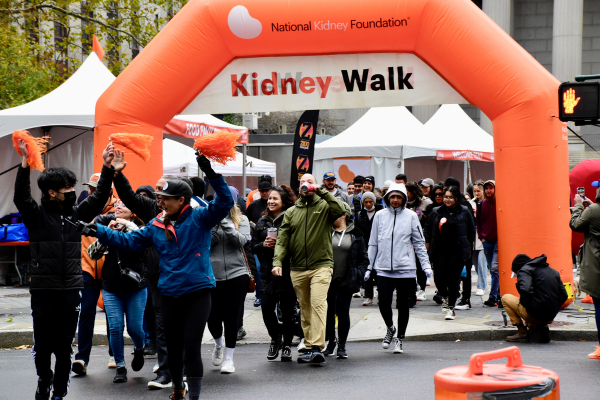May 04, 2023
Do you ever feel overwhelmed by the constant demands of kidney disease, struggle to stay present, or manage your stress levels? If so, you're not alone. In 2021, an estimated 57.8 million Americans lived with mental illness1, but help is available. If these struggles persist, reach out to a mental health professional and try these simple practices that may transform your life.
So, take a deep breath, let go of your worries, and join us on this journey to a happier, healthier you.
1. Learn mindfulness techniques

Yoga, deep breathing, and meditation. What do these activities have in common? They are all mindful-based therapies that help ground you in the present and teach you how to accept your thoughts and bodily sensations.
According to the American Psychological Association2, these techniques may help:
- Reduce stress, depression, and anxiety
- Manage pain
- Reduce fatigue
Want to give it a try? Read "Mindfulness and Kidney Disease" for tips from a social worker certified to teach mindfulness-based stress reduction.
2. Go outside

Have you heard of the phrase, "Stop and smell the roses?" There's a reason why the saying has persisted–spending time outside is good for you, and an increasing number of studies backs that up.
One such study3 found that time in greenspace may reduce:
So, go outside, touch the grass, or open a window and feel the breeze–your brain and body will thank you. If you cannot go outside, consider going on a virtual National Park tour or listening to nature sounds.
3. Surround yourself with community

No one can do everything on their own, so don't be afraid to ask others for help and spend time with your community. Need help finding people who can relate to your experiences?
Here are places to connect with other people with kidney disease.
NKF Peers
This free program connects people with late-stage kidney disease, including people on dialysis or those with a kidney transplant, with mentors who have lived well with kidney disease. Hearing from others with the same experience may help you adjust to a new lifestyle and maintain hope.
“I wanted to communicate with my children and Doris, my NKF Peers mentor, shared how she dealt with kidney disease in her family. She helped me find the language to explain it in a way my family would understand," said Manusca, NKF Peers Mentee. "Doris made it easy for me to ask questions and nothing was off limits. She shared her intimate experiences and helped me navigate the uncharted waters."
Get matched with a peer mentor.
NKF Communities
These online communities are full of people with kidney disease, living kidney donors, and potential donors who can offer support and guidance.
One user reported during a 2019 survey that the kidney disease community “really had made a big difference to my life, and I also enjoy the chance to be able to encourage and support others.”
Kidney Walk
Kidney Walks raise money and awareness to fight kidney disease. There you’ll meet others who have been touched by kidney disease.
"I couldn't believe how many people were affected by kidney disease. At Kidney Walk, we saw all these children who either had kidney disease or were in a family affected by kidney disease and it really encouraged us. It felt like a community that was there for us,” said Jeni Slater, mother of a child with kidney failure. “We've made a lot of connections through the local NKF office. We, the pediatric families touched by kidney disease, get together and support each other."
Walk with us for a better future.
4. Unleash your inner artist

There is a reason why art therapy exists. Engaging in creativity can help you open up, share your feelings, and even process emotions.4 The best part is you don't have to be talented to benefit from it. So get creative and experiment with different artistic mediums to determine what you enjoy.
Here are some ideas to get you started:
- Draw or color
- Paint
- Make pottery
- Knit
- Crochet
- Act in a community theater
If you are a perfectionist, consider taking an online or in-person class. You'll learn the craft and surround yourself with others who love it as much as you do.
5. Volunteer

If you’re looking for a mental health boost, consider volunteering. One study5 found that engaging in altruistic behaviors like donating money or sharing food, especially during the height of the COVID-19 pandemic, increased overall life satisfaction and lowered negative emotions like pessimism.
For Precious, becoming a volunteer advocate helped her heal after losing her child and kidney transplant just days apart.
“My success and passion for thriving have come from advocacy. Being engaged with individuals in the kidney community, having that opportunity to share my experience," said Precious, a home hemodialysis patient. "Not many people can say this, but I think I am better because of all that I went through. I'm now fulfilled because I'm helping people by advocating."
Ready to experience these benefits while finding a community? Become a Voices for Kidney Health advocate.
6. Play with a pet

Research in animal-human interactions is new but has found that pets may improve many people's mental health. The National Institutes of Health (NIH)6 has even launched studies to discover how.
Their preliminary research found that spending time with animals may:
- Decrease stress
- Improve heart health
- Increase emotional and social skills
While there are still investigations to determine why and to what degree, these results are promising! So, if you're feeling down, make time to play, cuddle, or watch whatever pet you, your friends, or family have. It may make you feel better.
Don't have a pet? Make an appointment with your local animal shelter where you can help walk dogs or play with cats. You'll get your fill of cute animals with the added benefits of volunteering!
7. Exercise

Getting or staying fit could change your life! With benefits ranging from higher levels of energy to lower levels of cholesterol and triglycerides, you won’t regret incorporating exercise into your daily activities.
Other benefits may include the following:
- Stronger muscles
- Better blood pressure control
- Better sleep
- Control over body weight
Exercise doesn't have to be hard or intense, either. Try simply walking, dancing, or swimming.
Here’s how to stay fit with kidney disease.
8. Eat healthily

Good nutrition that follows dietary guidelines, is key to good mental and physical health. With kidney disease, this may be more difficult since you may need to limit nutrients like phosphorus and potassium, but help is available. Ask your healthcare professional what diet is right for you, and find a kidney dietitian.
Three types of diets:
- DASH diet: Full of plant-based foods, low-fat dairy products, fish, poultry, beans, seeds, and nuts. It is low in salt, added sugars, and fat.
- Plant-based diet: Consists of plant-based foods like vegetables and grains instead of animal-based foods like red meat.
- Carbohydrate counting: Restricts the number of carbohydrates (sugar) eaten.
View our kidney superfoods or get kidney-friendly recipes.
Sources
1“Mental Illness.” National Institute of Mental Health, U.S. Department of Health and Human Services, https://www.nimh.nih.gov/health/statistics/mental-illness.
2American Psychological Association. (2019, October 30). Mindfulness meditation: A research-proven way to reduce stress. https://www.apa.org/topics/mindfulness/meditation
3University of East Anglia. "It's official -- spending time outside is good for you." ScienceDaily. ScienceDaily, July 6, 2018. <www.sciencedaily.com/releases/2018/07/180706102842.htm>.
4Espinosa JC, Antón C, Grueso Hinestroza MP. Helping Others Helps Me: Prosocial Behavior and Satisfaction With Life During the COVID-19 Pandemic. Front Psychol. 2022 Jan 27;13:762445. Doi: 10.3389/fpsyg.2022.762445. PMID: 35153950; PMCID: PMC8828552.
5Hu J, Zhang J, Hu L, Yu H, Xu J. Art Therapy: A Complementary Treatment for Mental Disorders. Front Psychol. 2021 August 12;12:686005. Doi: 10.3389/fpsyg.2021.686005. PMID: 34456801; PMCID: PMC8397377.
6"The Power of Pets." National Institutes of Health, U.S. Department of Health and Human Services, July 26, 2022, https://newsinhealth.nih.gov/2018/02/power-pets.









